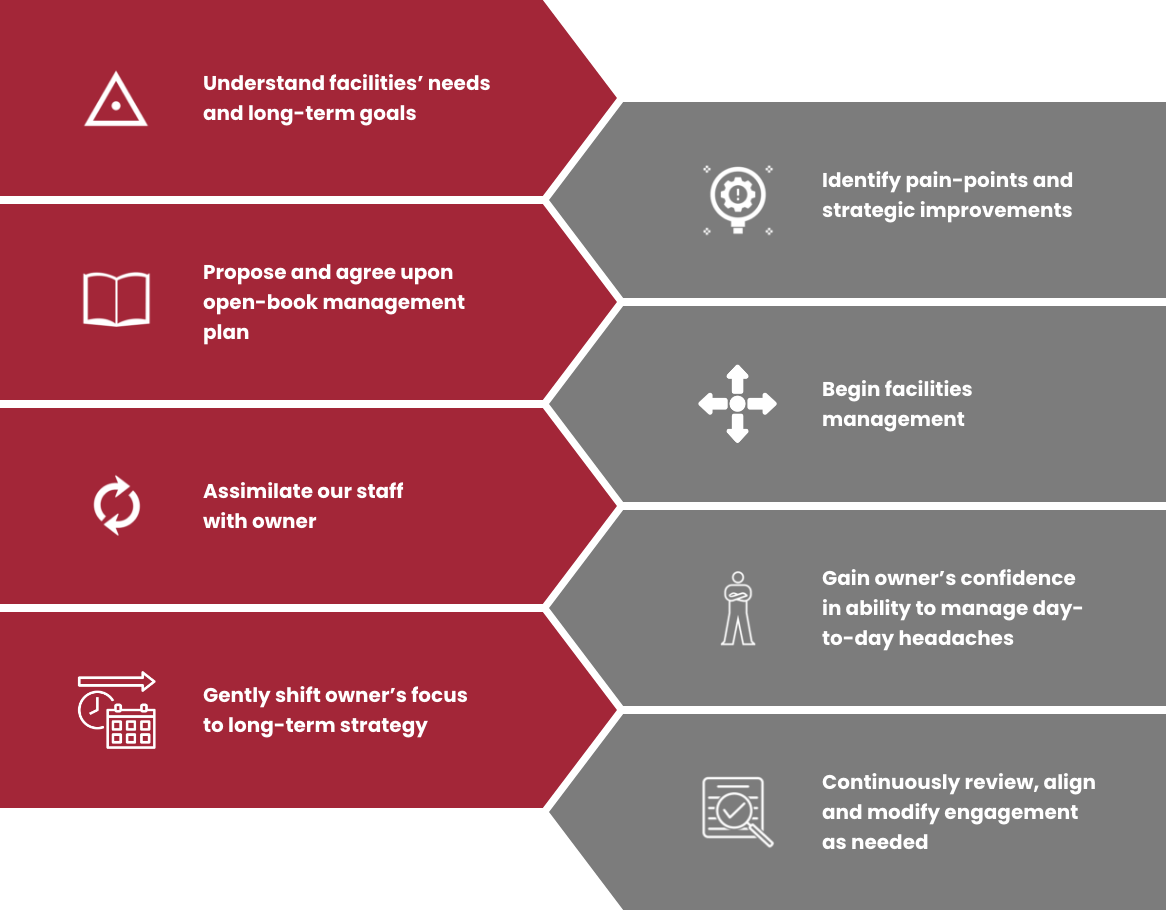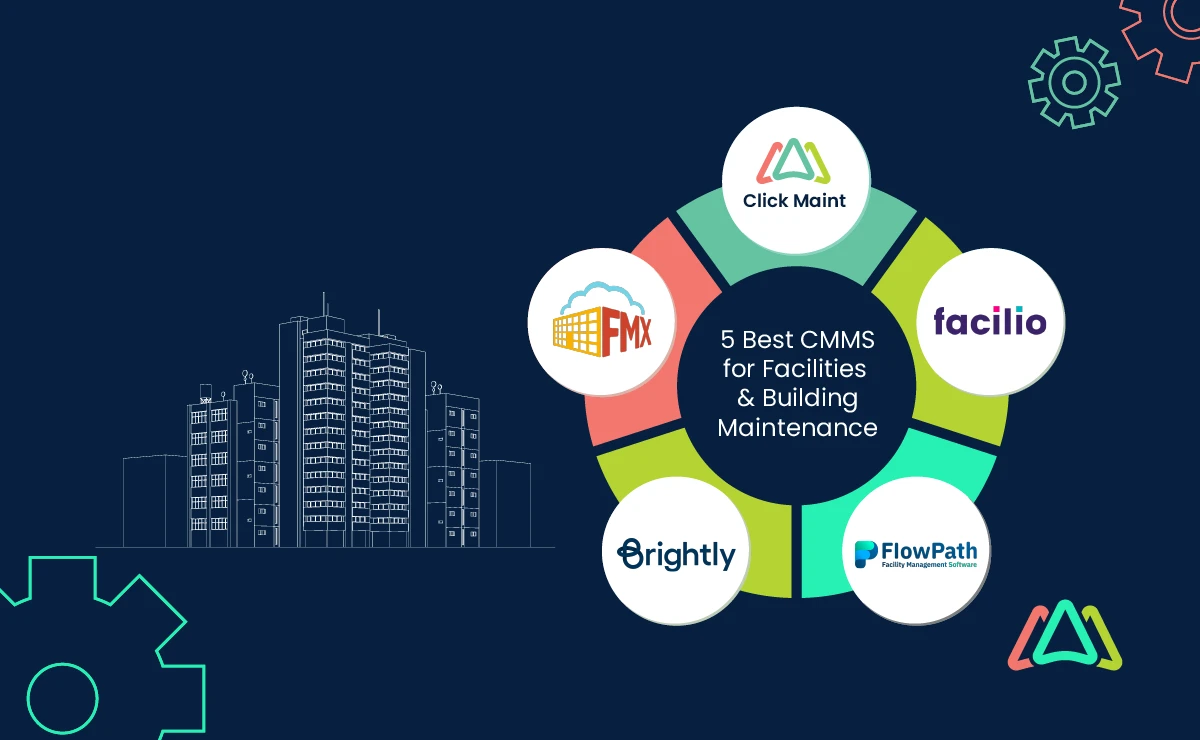The Role of Facility Management in Sustainable Operations
The Role of Facility Management in Sustainable Operations
Blog Article
Secret Patterns Shaping the Future of Facility Administration in 2024
As we look ahead to 2024, the landscape of facility management is positioned for considerable makeover, driven by a number of essential trends. The assimilation of wise building technologies and a change in the direction of data-driven decision-making assurance to improve functional performance while focusing on sustainability in practice.
Smart Building Technologies

Smart building modern technologies incorporate a wide array of systems, consisting of intelligent lights, heating and cooling controls, and safety and security systems. By integrating these systems, facility managers can keep track of and change specifications in real-time, causing considerable reductions in energy waste and operational expenses. Wise sensors can discover occupancy levels and readjust lights and temperature level as necessary, making certain that power is only utilized when needed.
Furthermore, these modern technologies promote improved data collection, permitting companies to track usage patterns and determine chances for more renovations. The execution of wise building technologies not just contributes to sustainability goals yet likewise creates much healthier workplace that can enhance worker productivity and satisfaction.
As we move into 2024, the fostering of smart building modern technologies will likely speed up, mirroring a broader change towards even more intelligent, responsive, and lasting center monitoring practices.
Data-Driven Choice Making
Progressively, organizations are leveraging data-driven choice making to improve center management methods. By harnessing information analytics, facility managers can derive actionable insights that substantially enhance operational efficiency and source allotment. The assimilation of advanced innovations, such as IoT sensing units and real-time monitoring systems, allows the collection of substantial amounts of information on building efficiency, tenancy rates, and energy usage.
This wide range of information enables center supervisors to recognize trends, predict upkeep demands, and proactively address concerns prior to they intensify. Anticipating analytics can forecast devices failures, decreasing downtime and repair service expenses. In addition, information visualization tools facilitate much better communication among stakeholders, ensuring that educated choices are made collaboratively.
Moreover, data-driven methods improve strategic planning by enabling facility supervisors to evaluate the efficiency of existing methods and make educated selections pertaining to financial investments in modern technology or infrastructure. As organizations increasingly prioritize operational quality, data-driven decision production is poised to come to be a cornerstone of effective facility management strategies in 2024 and beyond. Ultimately, the capability to leverage data efficiently will encourage organizations to develop a lot more efficient, productive, and durable centers.
Sustainability and Environment-friendly Practices
The focus on data-driven decision making naturally aligns with the growing focus on sustainability and green practices within center management. As organizations progressively prioritize ecological obligation, facility supervisors are leveraging analytics to enhance resource use, decrease waste, and minimize carbon impacts. This strategic strategy allows the combination of energy-efficient systems, such as LED lighting, clever a/c controls, and renewable resource resources into center operations.
In addition, the application of lasting methods expands past energy usage. Facility managers are promoting and adopting eco-friendly products recycling efforts to produce a circular economic situation within their facilities. This not just improves the environmental profile of the description company however additionally fosters a society of sustainability amongst workers.
Compliance with ecological regulations is one more vital aspect driving the adoption of green techniques. By using information analytics, center supervisors can monitor compliance metrics and determine areas for enhancement, making sure adherence to neighborhood and global sustainability criteria.
Crossbreed Job Versions
A significant change towards hybrid job versions is improving the landscape of center monitoring in 2024. This paradigm combines remote and in-office work, demanding a reevaluation of space usage, resource allowance, and staff member involvement strategies. Organizations are progressively identifying the relevance of adaptable workspaces that deal with diverse needs and preferences.
Facility managers have to adapt by applying versatile office designs that sustain collaborative initiatives while giving areas for concentrated job. This consists of the integration of modern technology to help with seamless interaction and partnership among in-office and remote staff members. Smart building options, furnished with analytics and sensors, permit real-time tracking of area usage, allowing companies to enhance their environments effectively.
Furthermore, hybrid work designs emphasize the demand for efficient facility management that focuses on staff member experience. In significance, the hybrid work design is transforming facility monitoring, urging a positive method to meet the advancing demands of the labor force.
Enhanced Occupant Health
As organizations embrace hybrid job versions, an increased concentrate on resident wellness is becoming indispensable to center management strategies. Facility Management. This change acknowledges that a pleased and healthy labor force directly impacts efficiency and retention prices. Center supervisors are currently focusing on atmospheres that advertise physical and psychological wellness, incorporating aspects such as all-natural illumination, biophilic layout, and easily accessible wellness resources

Modern technology plays a vital duty in this evolution. Smart structure systems can monitor ecological aspects and readjust setups in real-time, guaranteeing ideal comfort levels - Facility Management. Moreover, responses mechanisms, such as occupancy sensing units and staff member studies, enable facility managers to continually improve wellness efforts based on resident needs.

Conclusion
In 2024, the future of center management will be considerably affected by the integration of wise structure innovations and data-driven decision-making, promoting boosted operational effectiveness. Sustainability initiatives will certainly focus on green practices, while the emergence of crossbreed job models will require adaptable workplace designs. A heightened focus on click to read more passenger health via innovative HVAC systems and biophilic design will contribute to healthier work environments. These trends collectively underscore the developing landscape of facility administration in action to modern obstacles and possibilities.
Facility managers are promoting and taking on green products recycling campaigns to develop a circular economy within their centers.A considerable shift in the direction of crossbreed Check Out Your URL work versions is improving the landscape of facility monitoring in 2024.Additionally, hybrid job designs emphasize the demand for efficient center administration that prioritizes staff member experience.As organizations welcome hybrid work models, an enhanced emphasis on occupant health is becoming indispensable to center management approaches.In 2024, the future of facility monitoring will be significantly affected by the integration of clever building innovations and data-driven decision-making, cultivating enhanced functional efficiency.
Report this page